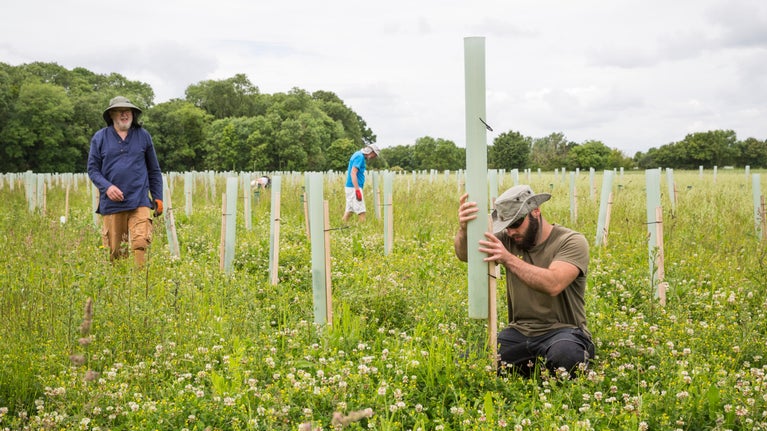
Tackling climate change
Uncover how we’re responding to the changing climate at places in our care.

The Ryevitalise Landscape Partnership in North Yorkshire works with local communities, volunteers and land managers to restore and enhance the River Rye and its tributaries. Discover how the project is encouraging people to reconnect with the history, cultural heritage and wildlife of the area.
The majestic River Rye meanders through a variety of landscapes from moorland and upland farmland, through villages, and the arable and livestock farmland of the lowlands - once a lifeblood for communities, providing clean water, power and supporting an abundance of wildlife, but our connection to the River Rye is gradually being lost. Ryevitalise crosses boundaries: the river does not recognise these.
The Ryevitalise Landscape Partnership in North Yorkshire works with local communities, volunteers and land managers to restore and enhance the River Rye and its tributaries, as well as encouraging people to reconnect with the history, cultural heritage and wildlife of the area. The whole project area is 413 km2 (approximately 160 square miles). Nearly two-thirds (63 per cent) is within the North York Moors National Park area and nearly one-quarter (23 per cent) is in the Howardian Hills Area of Outstanding Natural Beauty (AONB). The remaining 15 per cent is land outside of these Protected Landscapes, mostly arable farmland along the vale of Pickering. There are 532 miles of becks, streams and river!
Supported by The National Lottery Heritage Fund, North York Moors National Park Authority and other partners including disability groups and the Howardian Hills Area of Outstanding Natural Beauty, it is establishing Conservation Agreements with local land managers and delivering education activities to schools and outreach groups. They are also developing projects to improve water quality, training volunteers to undertake practical conservation tasks, as well as developing groups of Citizen Scientists to undertake species and habitat surveys.
This is a case study linked to the Climate and Land Summit hosted by the National Trust at the Wimpole Estate, in Cambridgeshire, on October 12, 2021, before the UN's annual climate conference COP26 in Cornwall in November that year.
Attendees at the summit represented some of England’s largest landowners and managers, and signed up to six guiding principles to commit to collectively working towards the nation’s net zero aims and pressing needs to adapt to a rapidly changing climate. To read the text of the Compact click here.

Uncover how we’re responding to the changing climate at places in our care.

National Parks England is an umbrella association of the authorities that care for the 10 National Parks in England.
Learn about the six climate and nature-based targets discussed at the Climate and Land Summit and how the solutions are being applied at National Trust places.

With support from the Government’s Green Recovery Challenge Fund, we're looking for ways to protect our environment and combat climate change. Find out more about the work we're doing.

From tips on saving water to combatting plastic pollution, learn more about our work to protect precious coasts and rivers for wildlife and people, and what you can do to help.

Discover the vital ways peat supports the environment, from carbon store to archaeological record, and see some of our key projects protecting and restoring the peatland in our care.

We’re tackling the threats of a changing coastline to safeguard the places you love. Find out how our teams are adapting their approach to our shifting shores.

Discover more about the National Trust’s role at COP26 in Glasgow and how you can help tackle the climate crisis.
